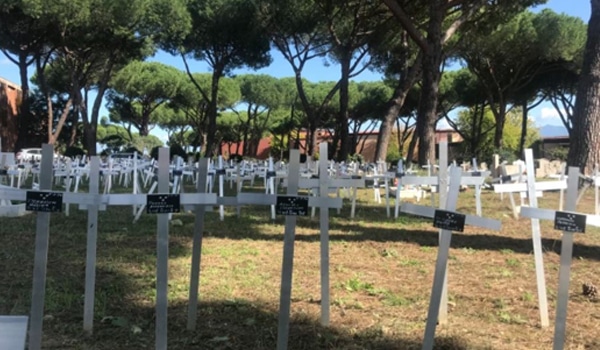
The cross had her name on it. Yet the woman was standing in front of it, alive. Many other wooden crosses bearing only a female name and a date were also stuck in the ground nearby, some dating back as far as 2004. The date on this woman’s was 2019, the year she had terminated a six-month pregnancy with an abortion. She said the abortion itself was like “a horror film” because she was denied an epidural and anaesthesia. She said: “Putting our names on crosses is merely the final step in a system that is set on punishing women who have abortions.”
Buried underneath the crosses were the remains of fetuses. She had never agreed for the fetus to be buried there; nor had she agreed for her name to be used in such a way. “In Italy, you give birth to a child, and they will have the father’s name; you have an abortion, and they will give the name of the mother,” she said. She visited section 108 of Flaminio cemetery days after another woman had described her own experience, having found her own name on a cross after reading an article about the so-called “garden of angels” in a local newspaper. She posted the details on Facebook, which led to a movement being formed. One woman described it as a form of public shaming of women.
Another woman was told by hospital staff that if she wanted a funeral and burial for her fetus, she would have to fill out a form. She didn’t. About seven months later, she said she began wondering what happened to the remains of her fetus and called the hospital, which told her the remains were still being held by the mortuary in case she changed her mind about a funeral, and that they would take care of them. Later, she found a cross with her name on it. Many of the crosses are made of wood and older ones have rotted and fallen over.
Under Italian law, fetal material from 20-28 weeks must be buried; up to 20 weeks, it is incinerated. Apparently, Roman Catholic groups have been conducting fetal burials at their own expense by striking agreements with local public facilities, including hospitals and cemeteries.
At least 130 women have asked prosecutors to investigate who was behind the burials, while women’s rights associations, such as Italian feminist organization Differenza Donna, have been gathering testimonies to coordinate joint legal action.Differenza Donna filed a formal complaint in the first week of October with the public prosecutor of Rome on behalf of dozens of women who were named on these crosses without their permission, who is investigating.
SOURCES: AlJazeera, byVirginia Pietromarchi, 16 October 2020 ; CBC News, by Megan Williams, 8 October 2020



